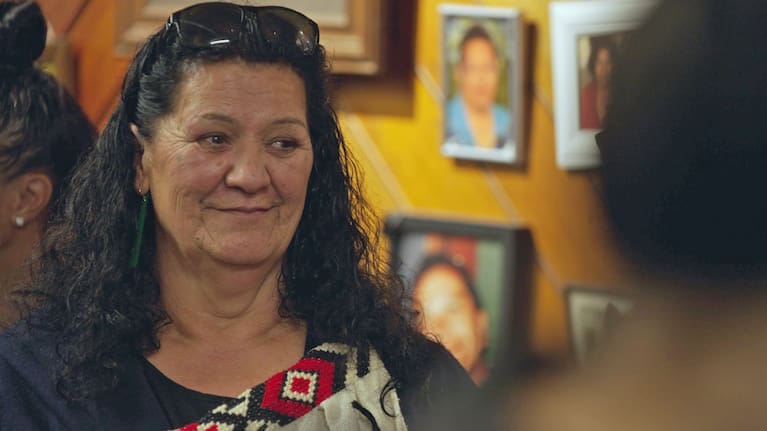When Jenny Small was adopted by Pākeha parents in the 1960s, she was cut off from her whakapapa. Six decades later, journalists Mihingarangi Forbes and Annabelle Lee-Mather reunite Small with her whānau.
Jenny Small was briefly Leanne Brown. That was the name she was given when she was born in Palmerston North Hospital in December 1962, the daughter of a Pākehā mother and a Māori father. Soon afterwards, she was adopted to a Pākehā couple from Levin and became Jennifer Small.
She wasn't alone - she was one of four Māori children adopted by her parents - but she still felt different.
“I thought I was a bit different from what the other Māori kids did. I always wondered why I wasn’t in kapa haka. Obviously, I felt I didn’t belong anywhere because I didn’t have a marae, I didn’t have an iwi.”
She may have felt different, but there were many like her. More than 100,000 New Zealanders were the subject of closed adoption between 1955 and 1995, a practice which saw any connection between the child and their biological family severed. As a result, tens of thousands of Māori were completely cut off from their whakapapa.
Small was one of those closed adoptions and she, like so many, suffered the lifelong ramifications.
For the most part she had a happy early childhood, but at 12, longing to understand her identity, she began to rebel. Her parents, concerned about her behaviour, reached out to a family friend for advice, who recommended they send her to Lake Alice Hospital, a psychiatric facility now infamous for horrific treatment of patients.
Small's records show she was never diagnosed with a psychiatric illness, yet she was subjected to painful electric shock treatments and medications so strong, she struggled to move.
"I couldn’t get out of the medication room. I had to walk myself along the wall to get out because I couldn’t walk,” she says.
Small remembers being told she had brought the treatments upon herself. "Cause I was naughty. That's all they'd say."

Give up their babies
Small's story of adoption followed by institution is a familiar one to Dr Maria Haenga-Collins. An academic, who was herself adopted to Pākehā parents, she has spent most of her career researching and writing about adoption.
She says it was often the case that Pākeha mothers had to give up their Māori babies, as they faced not only the stigma of pregnancy outside marriage but also the stigma of being associated with Māori.
“Parents were very forceful in making sure that their daughter didn’t marry a Māori,” she says.
As the adopted children grew up, their behaviour was often over-scrutinised.
“If you have a Māori child that you've adopted that starts to display normal angst, then that can be seen as the bad blood of the birth parents coming out. Māori children were picked up and placed into institutions at alarmingly high rates,” she says.
After three traumatic years, Small was released from Lake Alice at age 15.
Discovering her whakapapa
Small settled in the Horowhenua town of Shannon, and for the first time in her life went on to a marae. More than 40 years later, she remains a beloved member of the local community and a familiar face on the marae.
But without any idea of her whakapapa, Small has been unable to say her pepeha. She didn't want the same thing for her children.
In the 1990s she had started searching for her roots, applying for her birth certificate, which revealed her birth mother's name, town (Masterton) and that she was was 19 when she gave birth. Later, she discovered her mother was a nurse and also found her father was a hospital orderly and good rugby player.
But it wasn't until Small joined a Facebook group for New Zealanders impacted by closed adoption that she met journalists Mihingarangi Forbes and Annabelle Lee-Mather. They got to work, spending hundreds of hours researching Small's identity.
A DNA test revealed Small's paternal grandparents had eight sons, and led to the identity of her father. He had passed away in 2018.
Small's mother, Patricia, had also died, in 2020, but they found Small's maternal sister, who had no idea her mother had adopted out a baby.
After 60 years, Small finally connected with her whānau, meeting her sisters for the first time. “You look like your mum. And I can see my nana as well,” Small's sister told her.
After that, a bigger reunion was planned. Small's friends and supporters travelled from Shannon to Greytown, where she and three of her children were welcomed onto Pāpāwai marae, and into the arms of her father’s whānau.
"So, welcome home," she was told. "You have returned to the breast of your extended family, the Hemi family, the Ngatuere family and the Matiaha family.”

Law under review
Aotearoa's Adoption Act has been around since 1955. The Government says it is planning reform. For now, Haenga-Collins says the Government should apologise to adoptees.
“That’s naming that something happened, and that there’s been trauma in your life for a reason. All these feelings of rejection or abandonment, of never knowing where you come from. There’s a reason for that - and that was a state-sanctioned policy.”
But until that apology comes, Small's story might offer hope to others trying to rediscover the whakapapa that was taken from them.
* This story was created by Mata Reports with funding from NZ on Air and Te Māngai Pāho.



















SHARE ME